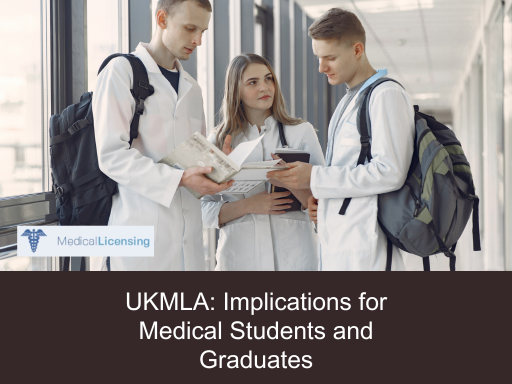The UKMLA (United Kingdom Medical Licensing Assessment) plays a pivotal role in the journey of medical students and graduates in the UK.
Introduction:
The UKMLA (United
Kingdom Medical Licensing Assessment) plays a pivotal role in the journey of
medical students and graduates in the UK. Aspiring medical professionals need
to understand the implications of the UKMLA and how it can impact their career
prospects and professional development. In this blog post, we explore the
implications of the UKMLA for medical students and graduates, shedding
light on its significance and the opportunities it presents.
-Licensure Requirement:
Discuss the UKMLA as a
key requirement for obtaining a medical licence to practise in the UK
Highlight the importance
of completing the UKMLA for medical
students and graduates to
progress in their medical careers
-Professional
Development:
Explore how the UKMLA
assesses core competencies, clinical skills, and professionalism, contributing
to the professional development of medical students and graduates
Discuss how the UKMLA
helps medical professionals further develop their knowledge, skills, and abilities
-Postgraduate Training
Eligibility:
Highlight the connection
between the UKMLA and eligibility for postgraduate training programs, such as speciality training or
general practice
Discuss how completing
the UKMLA can open doors to further professional advancement and specialisation
-Preparedness for
Medical Practice:
Discuss how the UKMLA
prepares medical students and graduates for the demands and challenges of
real-world medical practice
Explore how the
assessment aligns with the skills and knowledge required to provide quality
healthcare within the UK healthcare system
-Career Progression:
Address the implications
of the UKMLA for career progression and opportunities within the UK healthcare
system
Discuss how the UKMLA
serves as a benchmark for employers and institutions in evaluating the
competence and suitability of medical professionals
-International
Recognition:
Explore the
international recognition of the UKMLA and how it can facilitate career
opportunities and practice in other countries
Discuss the potential
benefits of holding a UKMLA qualification for medical professionals seeking to
work internationally
Conclusion:
The UKMLA holds
significant implications for medical students and graduates in their
professional journey. It serves as a licensure requirement, contributes to
professional development, opens doors to postgraduate training programs,
prepares individuals for medical practice, and influences career progression
within the UK healthcare system. Furthermore, the international recognition of
the UKMLA provides opportunities for medical professionals seeking to work
abroad. By understanding the implications of the UKMLA and embracing its
requirements, medical students and graduates can navigate their career paths
with confidence, ensuring they meet the necessary standards and competencies to
provide excellent healthcare to patients in the UK and beyond.
Tags: UKMLA, Medical Licensing,
MedicalStudents, MedicalGraduates, LicensureRequirements, MedicalEducation,
CareerImplications, UKHealthcareSystem, PostgraduatTraining,
ProfessionalDevelopment, LicensingAssessment, GMC, MedicalRegulation,
UKMedicalExams.




